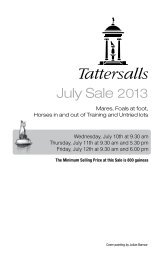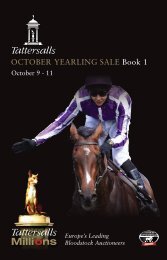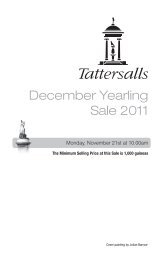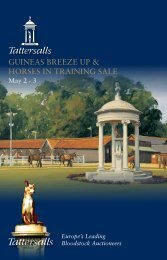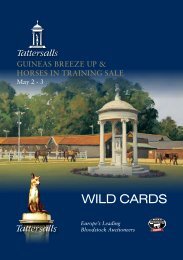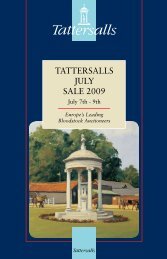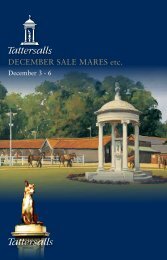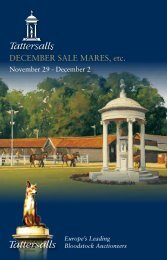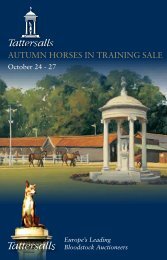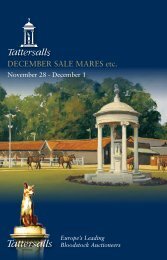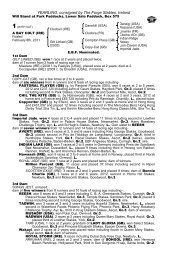- Page 1 and 2: CRAVEN BREEZE UP SALE April 16 - 18
- Page 3 and 4: l 2013/14 Sales Dates 4 2013/14 Sal
- Page 5 and 6: l tattersalls personnel 6 Tattersal
- Page 7 and 8: l overseas representatives 8 Overse
- Page 9 and 10: l tattersalls racehorse sponsorship
- Page 11 and 12: l notices to purchasers guide to ca
- Page 13 and 14: l notices to purchasers Conditions
- Page 15 and 16: l notices to purchasers Conditions
- Page 17 and 18: l notices to purchasers Conditions
- Page 19 and 20: l notices to purchasers Conditions
- Page 21 and 22: l notices to purchasers Conditions
- Page 23 and 24: l notices to purchasers Conditions
- Page 25 and 26: 26. Interest TATTERSALLS reserves t
- Page 27 and 28: l notices to purchasers Conditions
- Page 29 and 30: l notices to purchasers Guidance fo
- Page 31 and 32: l notices to purchasers Guidance fo
- Page 33: l notices to purchasers Guidance fo
- Page 37 and 38: l BHA/TBA 2010 inward buyers initia
- Page 39 and 40: REPOSITORY RULES APPLICABLE TO THE
- Page 41 and 42: (b) Unless retained by TATTERSALLS
- Page 43 and 44: Hotels Newmarket: Bedford Lodge Hot
- Page 45 and 46: MAIN BUILDING Tel: Park Paddocks Ex
- Page 47 and 48: Eligibility The following lots will
- Page 49 and 50: Index to TWO-YEAR-OLDS under their
- Page 51 and 52: Index to Dams of Two-Year-Olds Alba
- Page 53 and 54: Alphabetical List of Consignors and
- Page 55 and 56: Alphabetical List of Consignors - C
- Page 57 and 58: STALLION REFERENCE ACCLAMATION (GB)
- Page 59 and 60: STALLION REFERENCE Jacques Bouchara
- Page 61 and 62: STALLION REFERENCE International St
- Page 63 and 64: STALLION REFERENCE (IRE) (Rahy (USA
- Page 65 and 66: STALLION REFERENCE EXCELLENT ART (G
- Page 67 and 68: STALLION REFERENCE Budweiser Irish
- Page 69 and 70: STALLION REFERENCE WROTE (IRE) (Gre
- Page 71 and 72: STALLION REFERENCE BLUE KITTEN (USA
- Page 73 and 74: STALLION REFERENCE MASTERCRAFTSMAN
- Page 75 and 76: STALLION REFERENCE Cup, Haydock Par
- Page 77 and 78: STALLION REFERENCE SHAMARDAL (USA),
- Page 79 and 80: STALLION REFERENCE TAPIT (USA), Gre
- Page 81 and 82: Craven Breeze Up Sale 2013 Two-Year
- Page 83 and 84: S366 ..............................
- Page 85 and 86:
HORSE IN TRAINING, consigned by Mr
- Page 87 and 88:
HORSE IN TRAINING, consigned by Sev
- Page 89 and 90:
HORSE IN TRAINING, consigned by Kno
- Page 91 and 92:
HORSE IN TRAINING, consigned by Sev
- Page 93 and 94:
HORSE IN TRAINING, consigned by Moc
- Page 95 and 96:
HORSE IN TRAINING, consigned by Ban
- Page 97 and 98:
HORSE IN TRAINING, consigned by Cle
- Page 99 and 100:
HORSE IN TRAINING, consigned by Tal
- Page 101 and 102:
HORSE IN TRAINING, consigned by Oak
- Page 103 and 104:
HORSE IN TRAINING, consigned by Gro
- Page 105 and 106:
HORSE IN TRAINING, consigned by Kno
- Page 107 and 108:
HORSE IN TRAINING, consigned by Kno
- Page 109 and 110:
HORSE IN TRAINING, consigned by Bal
- Page 111 and 112:
HORSE IN TRAINING, consigned by Lit
- Page 113 and 114:
HORSE IN TRAINING, consigned by Cas
- Page 115 and 116:
HORSE IN TRAINING, consigned by Kno
- Page 117 and 118:
HORSE IN TRAINING, consigned by Ban
- Page 119 and 120:
HORSE IN TRAINING, consigned by Mis
- Page 121 and 122:
SIR BASIL (IRE), won Premio dell'Av
- Page 123 and 124:
HORSE IN TRAINING, consigned by Moc
- Page 125 and 126:
HORSE IN TRAINING, consigned by Moc
- Page 127 and 128:
HORSE IN TRAINING, consigned by New
- Page 129 and 130:
HORSE IN TRAINING, consigned by Hil
- Page 131 and 132:
HORSE IN TRAINING, consigned by Hil
- Page 133 and 134:
HORSE IN TRAINING, consigned by Moc
- Page 135 and 136:
HORSE IN TRAINING, consigned by Gro
- Page 137 and 138:
HORSE IN TRAINING, consigned by Oak
- Page 139 and 140:
HORSE IN TRAINING, consigned by Gro
- Page 141 and 142:
HORSE IN TRAINING, consigned by Moc
- Page 143 and 144:
HORSE IN TRAINING, consigned by Oak
- Page 145 and 146:
HORSE IN TRAINING, consigned by Kil
- Page 147 and 148:
HORSE IN TRAINING, consigned by Mis
- Page 149 and 150:
HORSE IN TRAINING, consigned by Oak
- Page 151 and 152:
HORSE IN TRAINING, consigned by Tal
- Page 153 and 154:
HORSE IN TRAINING, consigned by Bal
- Page 155 and 156:
HORSE IN TRAINING, consigned by Fri
- Page 157 and 158:
HORSE IN TRAINING, consigned by Moc
- Page 159 and 160:
HORSE IN TRAINING, consigned by Ban
- Page 161 and 162:
HORSE IN TRAINING, consigned by Mr
- Page 163 and 164:
HORSE IN TRAINING, consigned by Que
- Page 165 and 166:
HORSE IN TRAINING, consigned by Moc
- Page 167 and 168:
HORSE IN TRAINING, consigned by Fri
- Page 169 and 170:
HORSE IN TRAINING, consigned by Chu
- Page 171 and 172:
HORSE IN TRAINING, consigned by Hil
- Page 173 and 174:
HORSE IN TRAINING, consigned by Moc
- Page 175 and 176:
HORSE IN TRAINING, consigned by Moc
- Page 177 and 178:
Craven Breeze Up Sale 2013 Two-Year
- Page 179 and 180:
Meadowview Stables, Ireland R351 ..
- Page 181 and 182:
HORSE IN TRAINING, consigned by Gro
- Page 183 and 184:
HORSE IN TRAINING, consigned by Mr
- Page 185 and 186:
HORSE IN TRAINING, consigned by Haw
- Page 187 and 188:
HORSE IN TRAINING, consigned by Gro
- Page 189 and 190:
HORSE IN TRAINING, consigned by Yeo
- Page 191 and 192:
HORSE IN TRAINING, consigned by Ban
- Page 193 and 194:
HORSE IN TRAINING, consigned by Cas
- Page 195 and 196:
HORSE IN TRAINING, consigned by Yeo
- Page 197 and 198:
HORSE IN TRAINING, consigned by Haw
- Page 199 and 200:
HORSE IN TRAINING, consigned by Hil
- Page 201 and 202:
HORSE IN TRAINING, consigned by Cle
- Page 203 and 204:
HORSE IN TRAINING, consigned by Jam
- Page 205 and 206:
HORSE IN TRAINING, consigned by Moc
- Page 207 and 208:
HORSE IN TRAINING, consigned by Hil
- Page 209 and 210:
HORSE IN TRAINING, consigned by Haw
- Page 211 and 212:
HORSE IN TRAINING, consigned by Yeo
- Page 213 and 214:
HORSE IN TRAINING, consigned by Mea
- Page 215 and 216:
HORSE IN TRAINING, consigned by She
- Page 217 and 218:
HORSE IN TRAINING, consigned by Mis
- Page 219 and 220:
HORSE IN TRAINING, consigned by Pow
- Page 221 and 222:
HORSE IN TRAINING, consigned by Fri
- Page 223 and 224:
HORSE IN TRAINING, consigned by The
- Page 225 and 226:
HORSE IN TRAINING, consigned by Tal
- Page 227 and 228:
HORSE IN TRAINING, consigned by Kil
- Page 229 and 230:
HORSE IN TRAINING, consigned by Kil
- Page 231 and 232:
HORSE IN TRAINING, consigned by Moc
- Page 233 and 234:
HORSE IN TRAINING, consigned by Kno
- Page 235 and 236:
HORSE IN TRAINING, consigned by Ban
- Page 237 and 238:
HORSE IN TRAINING, consigned by Lyn
- Page 239 and 240:
HORSE IN TRAINING, consigned by Mr
- Page 241 and 242:
HORSE IN TRAINING, consigned by New
- Page 243 and 244:
HORSE IN TRAINING, consigned by Cas
- Page 245 and 246:
HORSE IN TRAINING, consigned by Oak
- Page 247 and 248:
HORSE IN TRAINING, consigned by Gan
- Page 249 and 250:
HORSE IN TRAINING, consigned by Gay
- Page 251 and 252:
HORSE IN TRAINING, consigned by Ban
- Page 253 and 254:
HORSE IN TRAINING, consigned by Chu
- Page 255 and 256:
HORSE IN TRAINING, consigned by Kno
- Page 257 and 258:
HORSE IN TRAINING, consigned by Tal
- Page 259 and 260:
HORSE IN TRAINING, consigned by Ed
- Page 261 and 262:
HORSE IN TRAINING, consigned by Gay
- Page 263 and 264:
HORSE IN TRAINING, consigned by Kil
- Page 265 and 266:
HORSE IN TRAINING, consigned by Tal
- Page 267 and 268:
HORSE IN TRAINING, consigned by Que
- Page 269 and 270:
HORSE IN TRAINING, consigned by Yeo
- Page 271 and 272:
HORSE IN TRAINING, consigned by Ups



